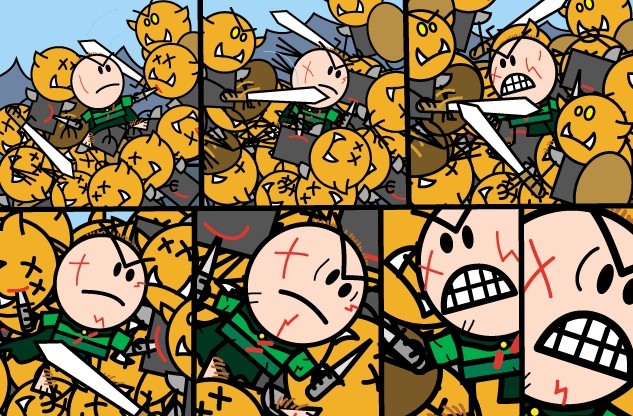LXXXIX: Proper Papers - Part 1
 •
by
•
by Little Old Halfling

Some theme music.


I've been wanting to write this series for a long time, and today, I finally get to it. I hope you enjoy this as much as I enjoyed writing it. Disclaimer: Yes, I know I missed some people, but I decided to include only a list of relatively current writers.

Archetypes Done Right
So, you want to be a media big shot, that G who gets all those Top 5 articles, rolling in the subs and comments, right? Well you gotta get with this if you wanna roll right, you feel?
If you're like the majority of the game world, when you get your first paper, you're not going to have a clue what to write about, who to do it, or who the heck will even read your paper. You just know you want that sweet shiny Media Mogul, and you want to be invited to the all the cool parties those big name writers get invited to.

Parties like this...

...and this...

...not this.
So sit back, and let's check out the major archetypes of writers out there and compare the dos and don'ts of each so that you, the reader and hungry writer, can get better.


The Pundit
One of the most common types of writer out there. Political commentating also is probably the hardest thing to make a successful paper out of, but as this is a political simulator, it's probably one of the most important as well. Any old schmuck on the street can tell you his opinion on political matters. What really makes the difference between good political commentators and bad ones is substance. It takes a mediocre writer to tell you that taxes are high and the government is controlling your life. It takes a great writer to tell you why and convince you of it.
Dos
- Have reliable and uncommon information which you can use to build a case.
- Make it interesting. Politics can be really boring. Spice it up with wit, parody, pictures, or controversy and you have something people will talk about.
- Talk about the why. People care about what's important, so tell them why it is.
- Include sources. Citing who said what and what law is being discussed will help immensely. It's all about grounding your piece in facts with this.
Don'ts
- Make things up. If you don't know something, find out about it. If you still can't find out, don't discuss it.
- Write boring paragraphs. Lots of text = snorefest.
- Puppet your own opinion. Your opinion is not a fact. It can, however, be complimented by facts, but if you only talk about why you think this and why you think that without backing it up, nobody will care.
- Be controversial for the sake of being controversial. These are troll articles, they will be covered later, but if you want to be a serious political commentator, stay away from just trolling.
Examples
The Hamilton Papers
Note Book
The Paperless Paper
The Fieldist


The War Correspondent
War coverage should seem like an easy taskYou know what's going on, who's doing it, and generally what it means. Which makes war commentating possibly the most difficult of all writing, because while it's very easy to see where things are going in the short term, big pictures and strategies can be hard to grasp. The great war correspondents, like all good writers, tell you why you should care, but with war it's much more tactics and strategically focused. War Correspondents are somewhat like the weathermen of our world. Replace "tornado" with "RW," "highs in the 90's" with "well-contested battle" and "low pressure system" with "invasion" and they're the exact same thing. There are few war correspondents because it's hard to make it with only war commentary, but it can be done.
Dos
- Use pictures. Seriously, this is a type of writing where you can basically use all pictures if you really need.
- Pointed explanation. With good pictures, all you really need is a simple analysis of the battle and why it will be important. Paragraphs are really not needed here unless something drastic is at hand.
- Stats. Stats. Stats. Fighting numbers, battle heroes, how many territories, which RW's. People eat numbers up.
- Suggest a course of action. It's all well and good to say what is happening, but to suggest what should and can goes farther.
Don'ts
- Use really bad pictures. If you're not good with some sort of picture editor, find someone who is. We know it's easy to get confused about things, but if you use the wrong picture in war commentating, people'll get angry.
- Only list stats. There's a gentle balance between too little and too much. People can get numbers from the battle page. Tell them what they mean.
- No sense of strategy. If you don't know what's going on or where it will lead to, you're going to look like a fool.
Examples
Stars and Stripes Journal
Tales from the Shire (Recent articles)
The World in Conflict Series

.jpg)
The Talk Show Host
When in doubt, interview. It's the simplest format out there, because in honesty, you're working off of someone else's fame and work. Your only responsibility as Talk Show Host should be to ask good questions. It is much harder to get well known for interviews than one would imagine, but if you ask good questions and interview important people, you can go far on this basic staple of writing.
Dos
- Ask good questions. Question leading is an art form. Knowing which questions to ask at the right time in the right way will make the difference between getting the canned answer and the great answer.
- Question many people. The wider variety of people interview, the more people who will be interested.
- Include pictures, it helps to break up the dialogue.
- Have a theme. Have a standard question you ask someone, or some sort of theme the everyone interviewed has done for them.
Don'ts
- Interview the same type of person. Unless you're really, really good at it, people like variety.
- Text wall. Seriously. Don't do it.
- Never. Insult. Your interviewee. Seriously.
- Don't ask the obvious. Go for what people may not think of at first but you think should.
Examples
Tales from the Shire (Older articles)
Hadrian's Wall
LexLuthor1 asks some SEALs The Five Questions
People I'm Proud to Know Series


The Teacher
Educational articles are always gold for writing. If you know the game, the mechanics, and how things are done, then you can teach other people how. And they'll love you for it. There is a bit of caution with this though: you cannot be wrong. As an example of how to do things, you need to have a solid, professional example ready to present. Anything less won't fly.
Dos
- Know you stuff. Facts, information, how to, everything. You must know your field to write about it so others can learn from it.
- Be engaging. Funny pictures, diagrams, examples; whatever makes it real.
- Be willing to learn yourself. Ask for suggestions, question others for information. In order to teach you must be willing to learn.
- Make it neat. More than any other type of writing, this must be as professional as possible. No one will use you as an example if it isn't top notch.
Don'ts
- Have false facts.
- Be informational but not engaging.
- Messy presentation.
- Educating about something useless.
The Keating Chronicles
A Sticky Situation
The CRoy Insider Series
The Welsh Returns
Education Today


The Troll
Most people tend to look down on the poor trolls. Admittedly, they deserve it, but some people do trolling in such an artful and majestic way you can't help but appreciate them. There's a fine line between telling the truth and trolling, and if you're blurring it, you know you're doing it right.
Dos
- Be controversial. Hit your opponent with the truth they so seek to hide. Then laugh at it and spit in the wound.
- Be funny. Trolling is there for others to enjoy. So make it enjoyable.
- Seriously. Be funny. You can be haughty, naughty, or just deadpan, but whatever you do, make the controversy interesting.
- Be truthful. Sometimes really good troll articles aren't funny. They transcend the bounds of trolling and go into a media expose of something. These are rare and true gems to be cherished.
Don'ts
- Be childish. People won't respect it if it's too debased.
- Overdo it. If you push too hard, it's not gonna be funny.
- Be annoying with it. This includes being idiotic about trolling, posting everyday about something, and generally being anything the people scoff at you for which, when you're a troll, is a lot.
Examples
My $0.02
The Half Times
A Little Claire-iffication
All Out Attack


The Everyman
The most abundant and easiest to write for type of writer out there is the variety show. The guy who does it all, does what they feel like doing, and does so repeatedly. The truth is that many papers don't really follow one archetype. All of them are really an offshoot of the everyman. But there are a few who take variety writing to new heights. They make it an adventure, a journey. And it's these who are often the greatest of all writers.
Dos
- What you like. Explore. Don't limit yourself. Variety is your spice and with it you will control the universe.
- Make it interesting. The most important factor in addition to variety itself, the everyman must be willing to do what is interesting. Mindless self-indulgence is boring.
- Have fun. If you're having fun writing, people can see it.
- Be consistent in some way. Themes are important here, and it helps to establish.
Don'ts
- Overindulge. People won't read if it's just lame stuff only you like. Papers are meant to be read, and while variety writing is basically a free ticket to doing whatever you want, it won't get you subs.
- Poor formatting. If it's organized like crud out of your pocket, no one will want to read. Make it a theme park, not a garbage can.
- Constant change is difficult. If you have no theme tying it all together, people will get confused.
Examples
The Paper Mache
Perpetual Motion
With a Vengeance
Sunday's Paper
Change You Can Believe In
The Way I See It
Voice of Candor
Klondike Express

I hope you enjoyed Part 1 of this series. Stay tuned for Part 2, where we analyze the many different ways in which you can write papers.


Stay frosty.


Comments
Enjoy!
Didn't bother reading, more smut = another stinking elite thinking they are being "cute"
pirinç yerken boğazıma kaçtı
voted for final pic.
wtf?! no me in the troll section?!?! well, i call that plain discriminating!
xD
George is jelly because he didn't make the elite show.
I am jelly I didn't make it, add a "bad newspaper" section xD
abi şu hatunun adı soyadı hayranım lan her yazıdan sonra hatuna vote ata ata bittim
Great shit Ath
awesome
Thanks for the mention Ath. A great article.
There should be a FA analysis section, or economics section
Jelly I split those a bit between educational and political.
>No Jewitt for Pundit
I'm guessing you don't read my paper...😛
Voted. Great article as usual.
OMAIGAWD I'M ON THIS PAPER.
Father, everyone who didn't make the elite show is secretly jelly...
V/
Unbelievably good education article, proving for damn sure you yourself are one of this nations most valuable authors.
God I hope these are filed somewhere for future reference, for the day a guy asks "How can I write articles people want to read?".
Very nice work Athanaric. Indeed.
i think you forgot the lulz paper
(frownie face)
Nice breakdown and advice Ath.
Fenalıklar gecirerek bosaldm
I wouldn't really call The Fieldist a pundit paper. Satire is sort of a different subject than a pundit paper in my opinion. Still, good article Ath, voted.